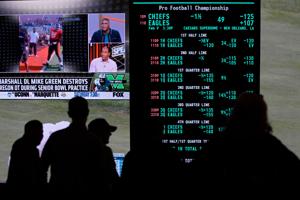Recent polling indicates a shift in American sentiment regarding legalized sports betting, with increasing criticism toward its impact on society and sports. This trend follows the U.S. Supreme Court’s decision in May 2018, which overturned a federal prohibition on sports betting in most states. The ruling has resulted in a surge of betting scandals involving athletes and officials, raising concerns about integrity within the sporting world.
A significant development occurred on Thursday when authorities announced the arrests of numerous individuals connected to a federal investigation into sports betting and illegal gambling. Among those arrested were notable figures such as Chauncey Billups, head coach of the Portland Trail Blazers, and Terry Rozier, guard for the Miami Heat. The investigation highlights the ongoing challenges associated with the rapid expansion of legalized betting.
Public Perception Shifts Amid Scandals
Despite the rising tide of criticism, Americans have shown a more lenient attitude towards betting in professional sports compared to amateur leagues. Polls reveal a growing unease around the ethical implications of sports betting, particularly in light of several high-profile scandals. The perception of sports betting has evolved, with many Americans now questioning whether it undermines the integrity of the games they love.
Research from various polling organizations suggests that public opinion is increasingly polarized. While some individuals view legalized sports betting as a legitimate form of entertainment, others express concerns about its potential to encourage gambling addiction and corrupt sporting events. The recent arrests serve as a stark reminder of the darker side of this industry.
The U.S. Supreme Court‘s ruling in May 2018 has led to a significant increase in the number of states allowing sports betting. Prior to this decision, the Professional and Amateur Sports Protection Act of 1992 effectively barred states from regulating sports wagering. Since the ruling, over 30 states have legalized some form of sports betting, with revenue from this sector reaching hundreds of millions of dollars. However, the rise in betting has also been accompanied by a corresponding increase in scandals and controversies.
Implications for the Future of Sports Betting
As the landscape of legalized sports betting continues to evolve, regulatory bodies are under pressure to address the integrity issues that have arisen. The recent arrests highlight the need for stronger oversight and accountability within the industry. Authorities are now tasked with ensuring that the growth of sports betting does not compromise the fairness of athletic competitions.
The potential for corruption and manipulation in sports betting raises questions for both regulators and fans. With incidents involving high-profile athletes, there is a growing demand for transparency in the betting process and greater safeguards against unethical behavior.
The future of sports betting in the United States remains uncertain. As public opinion shifts, stakeholders must navigate the delicate balance between embracing this burgeoning industry and protecting the integrity of sports. The recent scandals serve as a crucial reminder of the responsibilities that come with legalized betting and the need for comprehensive regulations to safeguard the future of sports in America.
